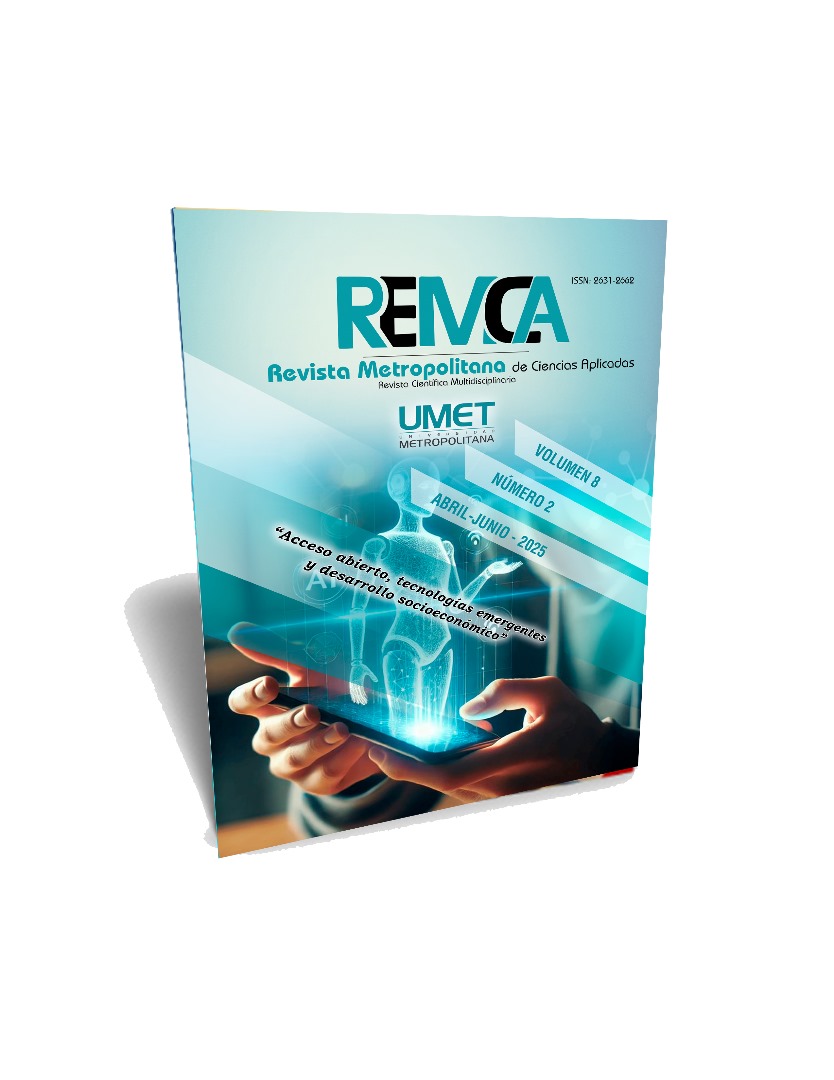Perspectiva de los profesionales de la salud ante adopción de inteligencia artificial en la medicina
DOI:
https://doi.org/10.62452/rn2d5e60Abstract
Artificial intelligence (AI) is transforming medical practice globally. Its implementation in diagnosis, treatment, and hospital management has been shown to improve the accuracy and efficiency of healthcare services. However, its adoption in Ecuador is hampered by several factors, including limited technological infrastructure, a lack of training for healthcare professionals, and the absence of a clear regulatory framework that guarantees safety and ethics in its application. This study employed a mixed-methods approach, combining quantitative and qualitative methods, to analyze the perception and acceptance of AI in the Ecuadorian healthcare system. Through surveys of 150 healthcare professionals and interviews with 15 medical technology experts, the main applications of AI were identified, highlighting its use in assisted diagnosis, personalized treatment design, hospital management optimization, and remote patient monitoring. The results demonstrate a growing interest in integrating AI into Ecuadorian medicine, although its adoption remains limited due to structural and regulatory barriers. The need to strengthen technological infrastructure, promote specialized training programs, and develop specific regulations governing the use of AI in healthcare is highlighted. While AI has the potential to significantly improve healthcare in Ecuador, its effective implementation requires comprehensive strategies that address both technological challenges and ethical and legal aspects.
Downloads
References
Adum Ruíz, J. H., Ruíz Ortega, M. G., Vera Ponce, H. J., & Álvarez Narváez, M. I. (2024). Inteligencia artificial en medicina: presente y futuro. RECIAMUC, 8(1), 166-177. https://doi.org/10.26820/reciamuc/8.(1).ene.2024.166-177
Albuja Sánchez, B., & Guadalupe Almeida, J. L. (2022). Áreas de estudio y aplicación de inteligencia artificial en las universidades mejor puntuadas del Ecuador. Revista Científica y Tecnológica UPSE (RCTU), 9(2), 58-74. http://scielo.senescyt.gob.ec/scielo.php?script=sci_arttext&pid=S1390-76972022000100058
Baudet Barros, J. T. (2019). Modelo de predicción de demanda de camas para el Hospital Clínico de la Red de Salud UC Christus. (Trabajo de titulación). Universidad de Chile.
Díaz, O., Rodríguez-Ruiz, A., Gubern-Mérida, A., Martí, R., & Chevalier, M. (2021). ¿ Son los sistemas de inteligencia artificial una herramienta útil para los programas de cribado de cáncer de mama? Radiología, 63(3), 236-244. https://www.sciencedirect.com/science/article/abs/pii/S0033833820301752
Galarza Medina, K. X., Maldonado Coronel, K., & Herrera Guanopatin, M. S. (2024). Beneficios y Riesgos de la Implementación de Inteligencia Artificial en los Procesos de Diagnóstico Médico en el Ecuador. Ciencia Latina Revista Científica Multidisciplinar, 7(6), 7276-7299. https://doi.org/10.37811/cl_rcm.v7i6.9274
Montalván-Vélez, C. L., Mogrovejo-Zambrano, J. N., Romero-Vitte, I. J., & Pinargote-Carrera, M. C. (2024). Introducción a la inteligencia artificial: Conceptos básicos y aplicaciones cotidianas. Journal of Economic and Social Science Research, 4(1), 173-183. https://economicsocialresearch.com/index.php/home/article/view/93
Moreno, E. C., & Sanz, J. B. (2023). Manual práctico de inteligencia artificial en entornos sanitarios. Elsevier Health Sciences.
Noboa-Terán, C. A., Ramirez-Hecksher, A. M., & Medina-Avelino, J. A. (2024). Evaluación de técnicas de inteligencia artificial para predicción de señales de electrocardiograma. Guayaquil. Ecuador. 2023. MQRInvestigar, 8(2), 3962-3976. https://www.investigarmqr.com/ojs/index.php/mqr/article/view/1440
Sánchez Madriz, L. J., Soto Benavides, D. C., Shion Pérez, J. F., Palma González, L. D., & Camacho Arias, N. P. (2024). Inteligencia Artificial aplicada al diagnóstico médico: una revisión actual. Revista Científica De Salud Y Desarrollo Humano, 5(2), 274–288. https://doi.org/10.61368/r.s.d.h.v5i2.183
Toapanta Defaz, M. V. (2021). La inteligencia artificial en la gestión de los servicios de Salud Pública del Ecuador. Caso: diagnóstico de la enfermedad de Parkinson, 2020-2021. (Tesis de maestría). Instituto de Altos Estudios Nacionales-IAEN.
Ventura-Fernández, T. Y., Soldevilla, E. V., & Ventura-Fernández, F. G. (2021). Predictibilidad en el diagnóstico utilizando Watson de IBM. Revista Vive, 4(10), 86-95. https://www.revistavive.org/index.php/revistavive/article/view/78
Downloads
Published
Issue
Section
License
Copyright (c) 2025 Marcos Aníbal Lalama-Flores, Marcos Stefano Lalama-Gavilánez, Carlos Gustavo López-Barrionuevo, María Augusta Reyes-Pérez (Autor/a)

This work is licensed under a Creative Commons Attribution-NonCommercial-ShareAlike 4.0 International License.
Authors who publish in Revista Metropolitana de Ciencias Aplicadas (REMCA), agree to the following terms:
1. Copyright
Authors retain unrestricted copyright to their work. Authors grant the journal the right of first publication. To this end, they assign the journal non-exclusive exploitation rights (reproduction, distribution, public communication, and transformation). Authors may enter into additional agreements for the non-exclusive distribution of the version of the work published in the journal, provided that acknowledgment of its initial publication in this journal is given.
© The authors.
2. License
The articles are published in the journal under the Creative Commons Attribution-NonCommercial-ShareAlike 4.0 International License (CC BY-NC-SA 4.0). The terms can be found at: https://creativecommons.org/licenses/by-nc-sa/4.0/deed.en
This license allows:
- Sharing: Copying and redistributing the material in any medium or format.
- Adapting: Remixing, transforming, and building upon the material.
Under the following terms:
- Attribution: You must give appropriate credit, provide a link to the license, and indicate if any changes were made. You may do this in any reasonable manner, but not in any way that suggests the licensor endorses or sponsors your use.
- NonCommercial: You may not use the material for commercial purposes.
- ShareAlike: If you remix, transform, or build upon the material, you must distribute your creation under the same license as the original work.
There are no additional restrictions. You may not apply legal terms or technological measures that legally restrict others from doing anything the license permits.




